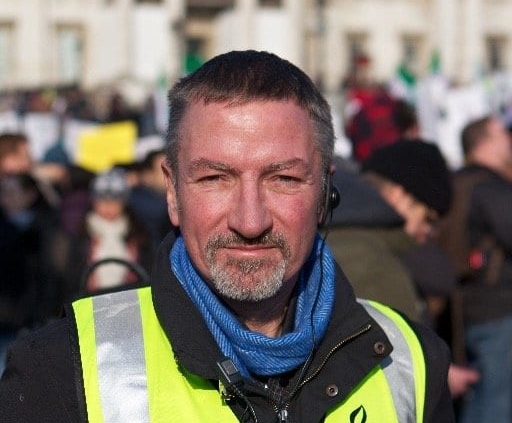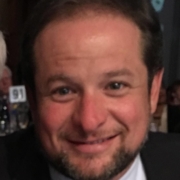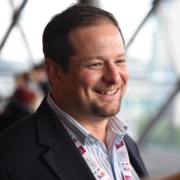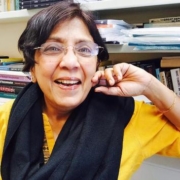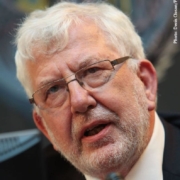Unions are on the front lines of advocating human rights. That puts them in natural collaboration with non-governmental organizations doing the same. Amnesty International is one such NGO that has strong ties to global trade unions.
Today I speak with Shane Enright(@ShaneEnrightTU), a Workers’ rights campaigner and global trade union adviser at Amnesty International. He recounts various campaigns organized by Amnesty that have tried to pressure governments to release some teachers held in prison. He also talks about climate change and the September 20th general strike.
Citation: Enright, Shane, interview with Will Brehm, FreshEd, 169, podcast audio, August 26, 2019. https://www.freshedpodcast.com/shaneenright/
Transcript, translation, resources:
Will Brehm 1:03
Shane Enright, welcome to FreshEd.
Shane Enright 1:05
I’m very happy to be with you and very happy to be with your listeners. I’m speaking to you from a very humid Bangkok at the Education International Congress.
Will Brehm 1:16
Yes, it’s been quite a week. But let me ask you a question. You have a very interesting background. You started in transport and now you work for Amnesty. Tell me how you got involved in the unions in transport?
Shane Enright 1:29
Well, it’s been quite a long journey and I suppose I better start at the beginning. I was born 59 years ago in Spain and raised by a hippie mother, and really impacted by living under a dictatorship. And in that dictatorship, social movements and political movements were repressed but the unions were working underground. So, even as a young kid, I was very conscious of the positive role that unions can play in representing and defending people’s rights. When I got to the UK, the first couple of jobs I had, which were casual jobs, I saw a great deal, in particular, unfortunately, of racism and of ill treatment of workers. So, the first permanent job I got, I immediately joined the union and its sort of in my nature not to be on the sidelines, but to be active, and to be positive, and to try to bring about that change. So, you know, for my scenes over the eight years or so that I worked in community organizations, I managed to get sacked three times for organizing. It didn’t stop me, keep on going. And eventually my union -which is a general union with over a million workers, a substantial number of whom are unskilled. Many in the transport sector- my general union asked me to come and work at the headquarters in London. So, I had eight years working in the headquarters of the Transport and General Workers Union. And it was a diversity of roles. So, because I have language skills, I worked as an assistant in the international department. I worked in the research department. I did a couple of years really interesting work as an industrial advisor on food, drink, and tobacco industries. So, it’s pretty wide ranging but at a certain point in time, the International Transport Workers Federation, which is one of about 10 global unions, the only global union also based in London. The International Transport Workers Federation had a bit of a problem in terms of a short-term staffing need. And one of my former colleagues at the Transport and General Workers Union had moved over there and a suggestion had been made that maybe I could fill the gap because again, it requires somebody with language skills. So apparently, behind my back, my general secretary made a deal with their general secretary for me to go on secondment for six months. And lo and behold, I was so much in my element, the six months turned into 10 years. And I was promoted through the lines and I was aviation secretary, which meant that I was responsible for supporting 1 million organized aviation workers around the world -everything from mechanics, to check-in staff, to baggage handlers, cabin crew and pilots.
Will Brehm 4:27
So, you have a long experience in unions -different types of unions doing different types of jobs. How did you make the transition to Amnesty International?
Shane Enright 4:37
Well, for a start, when I die, they’ll bury me with -it’ll say, “I’m a trade unionist” because that’s what I am. That’s my fundamental core identity. The shift really was a pragmatic one. One of the problems as aviation secretary in the International Transport Workers Federation was, I was traveling for 30 weeks a year. I was taking on average 60 flights a year. And as a global union that provides financial support for our poorest affiliates to participate in events. They and the staff, therefore, have to fly economy. So, it was very, very demanding, and particularly disruptive in terms of any possibility of a sort of sustainable home life. So, even though I would certainly say that it’s the best job in the world because aviation workers are the most globalized, by definition they are the most international, by definition they’re the most multilingual, most multicultural. So, it’s an absolutely awesome role. We were very successful. We doubled the membership. But after nine years, I said, “Okay, I’m going to stop this job on my 10th anniversary”, basically to look for a job in London.
Will Brehm 5:56
So, it was less traveling and stay home basically.
Shane Enright 6:00
Now, there was no way that I was going to look for a job that wasn’t trade union rights centered or workers’ rights centered, and as it happened, after a break, when I was ready to look at what that opportunity might be, the very first job that I saw was for a trade union campaign manager at the United Kingdom section of Amnesty International. And it was clear from the information pack that they sent me that actually, this was a newly created job. That Amnesty International had strong relationships with trade unions in the United Kingdom. And that they wanted to upscale the work with trade unions. Now, even though trade unionists are, by definition, human rights defenders, because their core function is to promote workers’ rights, most trade unions wouldn’t see themselves in those terms. And I’m very conscious that the world of human rights is very conflicted. So where, for example, does the balance between LGBTI and religious rights lie? What is the limit of freedom of expression versus hate speech? Incredibly complex, incredibly subtle, and rather, historically alien world to me apart from, you know, tub-thumping headlines. And I thought, well, I want to learn about this world. This would be a great opportunity to start to understand some of the complexities while retaining, of course, that fundamental identity as a trade unionist supporting trading unions.
Will Brehm 7:37
So, Amnesty International is a non-governmental organization and working a lot in human rights.
Shane Enright 7:43
Yes.
Will Brehm 7:43
How is it connected to the trade unions globally?
Shane Enright 7:47
Well, Amnesty International was formed in London in 1961. It now has national sections in over 60 countries, it pulls together around 7 million supporters, it’s a research and evidence-based led organization, to the extent that we look at human rights abuses of different forms in different countries, we write reports about them. But unlike other NGOs, we’re also a campaigning and mobilizing organization. So, not only do we provide the evidence of abuses, we then develop campaign strategies to address those abuses and to rectify the deficits. And those campaigns depend on activists on the ground, or they depend on our parliamentary or political advocates, they depend on our work across our different communities. And one thing I’d say just before we continue is Amnesty is what we call a “full-spectrum” human rights organization and that means that we will cover all of the rights contained in the Universal Declaration of Human Rights, workers’ rights, LGBTI rights, right to education, right to food, socio-economic rights, as well as political rights and freedom of expression.
Will Brehm 9:07
There’s a lot of rights! I mean, there’s like 300, or huge numbers of rights.
Shane Enright 9:12
UDHR has, I think, 54 articles
Will Brehm 9:15
I mean, aren’t there more rights being proposed.
Shane Enright 9:18
Well, there are more all the time. For example, you know, I will constantly remind my colleagues that the core conventions of the International Labour Organization, there are 8 of them, are also universal human rights, and you can stretch that as far as you want.
Will Brehm 9:32
So, and Amnesty being a full spectrum, meaning anytime there’s a new human right, that sort of gets adopted at that global level, which I think happens quite regularly, it gets included in Amnesty’s work?
Shane Enright 9:42
Well, we obviously have to make choices. So, for example, there are journalists in jail all over the world every single day. We can’t campaign on behalf of every individual. What we will do is we will identify a case or a country where we think that improvement for that individual can lead to a wider political and social change that will benefit a larger number of people. And similarly, there’s some subjects that we have expertise on, and there are others in which we don’t. So, for example, we’re not doing a great deal of work in the UK at the moment around the right to housing, but there are plenty of other NGOs that do that.
Will Brehm 10:23
Yeah. Okay. And trade unions. There’s a lot of mobilization happening on the trade unions. They’re connected to human rights. Amnesty is connected to human rights doing mobilization. So, there’s a nice overlap.
Shane Enright 10:31
But you asked me a specific question, “what’s the relationship between Amnesty International and trade unions”?
Will Brehm 10:33
Yea, exactly!
Shane Enright 10:36
Well, one of the things that appealed to me about the UK role in a trade union campaigner that I took on is that Amnesty’s UK section, which is one of 60, is unique in having a long-standing arrangement for trade unions to affiliate to us. So, we don’t see trade unions as external partners that we might collaborate with from time to time, but we see them as part of our internal community, just like our youth groups, or our student groups, or other local activists. They come to our annual general meeting; they vote our annual general meetings. And so, they’re part of us. And this year, we will be celebrating, on world Human Rights Day, we will be celebrating the 40th anniversary of our UK trade union network.
Will Brehm 11:26
Wow!
Shane Enright 11:27
And it’s because that community exists within Amnesty, the decision was taken to create the role I now have. Now trade unions of course, as I said earlier on, are by definition, human rights organizations. But trade unions also have a very wide social justice agenda. So, to give a concrete example in the United Kingdom, many unions, particularly in the education field, but also in the health field, have conference policies on female genital mutilation or policies on early and forced marriage. That’s a domain that Amnesty International is also working in. So, we made common calls with the UK teacher trade unions and others, to get them to support an application we were making to the UK Government for funding to run some human rights education projects on female genital mutilation in Sierra Leone and Burkina Faso. And without the support of our UK union partners, we wouldn’t have qualified to make that application. So, they open new doorways to us. And of course, let’s not forget the scale of unions. So, unions in the UK are the biggest social justice movement that we have. And we have Amnesty International to show some humility and some recognition. I’ll give you a different example. One of the things that trade unions have -not just in the UK but across certainly the developed world- autonomous LGBTI caucuses within their memberships. And LGBTI rights is also a major concern for Amnesty. Internationally but also in the UK, we have our own LGBTI network, which campaigns on relevant issues. And the last couple of years our focus has properly shifted towards the question of trans rights, trans people being you know, marginalized and subject to all sorts of repression in many different countries and in many different contexts and we chose to work with Sakris Kupila, a trans man from Finland, who was required to undergo sterilization and medicalization before his gender would be recognized. So, we ran a very widespread campaign amongst Amnesty activists in the UK to seek to convince the government of Finland to change their attitude. And as part of that campaign, TUC invited Sakris to be the keynote speaker at the TUC’s LGBT conference last summer. So, Sakris came along, I went with him, it was a very successful intervention. And lo and behold, three months later, at the TUC Congress, the TUC passed, overwhelmingly, a resolution in support of self-identification rights for trans people, which is a response to a consultation that government’s undertaking at the moment. So, you know, this is an example of working hand in glove for a common cause.
Will Brehm 14:40
So, the Finnish government is considering changing its attitude?
Shane Enright 14:43
Well, the good news is not only have we now got TUC policy in Britain but there’s been a change of government in Finland and virtually all of the demands that were being made by the trans community in Finland are now on the agenda for the new government. So, there’s been really substantial progress both in terms of Sakris’ rights, and those of his community, and in terms of a positive change here in the UK.
Will Brehm 15:09
Yeah, it’s interesting. It’s sort of like this black box of social mobilization. All this behind the scenes work, speaking at a conference, mobilizing campaigns, connecting to trade unions, NGOs involved, lobbying government, I mean, all of these things are sort of so key, and sometimes sort of hidden from the public eye.
Shane Enright 15:28
But let me give you a really great example of how that can work. So, we’ve been working in partnership with Education International to seek freedom for Mahdi Abu Deeb, the Bahraini teacher trade union leader, who was imprisoned solely for carrying out his legitimate trade union activities. In fact, he was tortured in prison, as well.
Will Brehm 15:53
He was there for five years?
Shane Enright 15:54
He was there for five years. And so, we were campaigning on his behalf in the UK and but internationally, but all our campaign strategies were pre-planned and pre-discussed with Education International, and the fact that this was a partnership with Education International meant that we automatically had buy in from all the UK teacher trade unions, so they were behind us in what we wanted to do. We also knew that the Government of Bahrain was spending 10 million pounds a year to hire two PR companies to whitewash their public relations reputation in the United Kingdom alone. So about 10 million they were devoting to public relations just in the UK. So, one of the projects that we did was to work with our youth groups in primary schools, to get them to send solidarity messages to Mahdi, but also protests to the Bahraini embassy. Now, I have to say to you, it doesn’t matter how many million dollars you have, you cannot whitewash away the commitment of those young people, the activism that they’re showing, and that of course, really put the ambassador’s nose out of joint. So, a case of each of us leveraging the tools that we have.
Will Brehm 17:14
So, what happened to him?
Shane Enright 17:16
Mahdi was released. Now, I’ll be frank, he wasn’t released early. But by the point at which Mahdi was released, the jails of Bahrain had been installed with revolving doors. So, the most prominent political activist, no sooner were they out, then they were immediately re-arrested on another charge and straight back into the Bahraini judicial system. So, that hadn’t been a feature earlier on, but it was a very widespread feature at the point when Mahdi was released.
Will Brehm 17:47
So, is he gone back to jail?
Shane Enright 17:48
No. So, what we did was, we ran an international 10-day countdown to the date of Mahdi’s release. And this was a Twitter countdown. And it coincided for example, with the NASUWT conference -500 people in the room holding placards, photos being taken. We did a protest outside the Bahraini Embassy in London, with another photo six days to Mahdi’s release etc. Very very vital impact. The thing about Twitter, and I’m not really a social media person, but I took up twitter in a serious way because it’s about the only uncensored way that Bahraini’s can know, what is happening on their behalf from outside the country.
Will Brehm 18:37
Because mainstream media is just sort of state censored.
Shane Enright 18:39
Mainstream media is state-censored and controlled. And of course, if people express themselves too freely on Facebook, then they put themselves at risk. Whereas, you know, merely following a Brit that’s saying all sorts of interesting things tends to slip through the censorship net. So, you know, I was aware that many of my tweets were reaching Mahdi Abu Deeb’s daughter, who I had met during the course of the campaign. And so yes, in terms of the outcome, not only did the revolving doors not turn for Mahdi at all, and having subsequent –
Will Brehm 19:18
In fact, he’s here, I met him.
Shane Enright 19:20
Yes. But he’s had a level of freedom of movement, that other former political prisoners have been denied. So, I met him first of all, when he won the very prestigious Arthur Svenson award in Oslo a couple of years back, and this will be the third time that I’ve had the privilege to be with Mahdi and his colleague, Jalila al-Selman. So, you know, sometimes you have to measure success by keeping people safe rather than necessarily getting them out. But it’s an example of a major campaign. And at the moment we’re campaigning on behalf of another teacher trade unionist is this time, Esmail Abdi in Iran.
Will Brehm 20:00
And what’s happening?
Shane Enright 20:01
Well, the situation is very difficult because the geopolitical situation between Iran, the UK and the US is, as you know, has deteriorated very recently even in the prominent case of Nazanin Ratcliffe, her situation is very, very poor. So, we’re really working in the background at the moment on Esmail’s case, because we think that work that’s too prominent in the foreground is actually not going to help him. So, we have to make these judgment calls about what are the best way.
Will Brehm 20:31
But what’s he being charged with or held for?
Shane Enright 20:34
Well, he took part in a number of protests outside the Ministry of Education to complain about cuts in the budget and the poor standards of teaching were available to kids in Iran. And he also wanted improvements in working conditions and an increase in the number of teachers in the classroom. So, these are absolutely bread and butter issues of unions. We’ve discussed openly and freely in most of the places that I visit, but the Iranian state will brook no opposition, and it’s important to understand in Iran the Constitution says that trade unions must be Islamic in character. That means that independent trade unions are determined by the courts to be acting contrary to the state. So, it’s treason simply to have an independent trade union.
Will Brehm 21:31
Wow!
Shane Enright 21:32
Nevertheless, independent workers organizations have been very tenacious. So particularly we have the Tehran Bus Workers Union, that’s been active for 10 years. We have the Haft Tapeh Sugarcane Refining Mill Workers -50,000 of them have been active for many years. And the third major group are the Iran Teacher Trade Associations which Esmail Abdi is a member. And we’ve worked with the bus workers before, we’ve worked with sugar works before, we’re working with Esmail now. And the problem in Iran is that as the economy has declined as a result of sanctions, workers are going unpaid for longer and longer periods of time, we’re talking about six-month periods of not being paid. We’re talking about deteriorating working conditions, we’re also seeing the expropriation of public assets, by cabal of the revolutionary guard, through processes of privatization. So, there have been spontaneous mass uprisings by unorganized workers groups, and the state’s found it very, very difficult to deal with that. But there’s been a tendency, for example, to not only imprison workers engaged in these spontaneous protests around working conditions, they aren’t calling for the overthrow of the state by any means, it’s practical stuff like I want my bread on the table. But we’re seeing an increasing trend, for instance, for flogging to be included in the sentences of these people. The state is clearly very scared.
Will Brehm 23:10
I mean, these are incredible stories. And I’m sure there’s more of them in all different parts of the world. But I want to ask a question about a different sort of issue that isn’t necessarily about an individual in a particular context that, you know, might have laws in the state against unions, which we know there’s plenty of. But an issue that is perhaps more -well, certainly- global in nature, and sort of affecting everyone if we like it or not and that that issue is climate change.
Shane Enright 23:38
Sure. Absolutely.
Will Brehm 23:39
Yeah. I mean, this is an issue that is obviously -the young people in the world today are fed up with it. They’re looking at old policymakers and saying, “You’re not answering the questions that I have; you’re not furthering the interest that I have as a child.” There’s an existential crisis going on, where young people today are looking into the future and saying, “I don’t even know if we’re going to be alive when I get to be your age.” So how does Amnesty International fit into this large issue of climate change or the climate crisis as we now call it?
Shane Enright 24:10
Will, I’m so glad you asked me because that’s perhaps the most important challenge that we face today. And by the way, it’s not just young people that are fed up with it. Some oldies like me, are certainly fed up with it. Amnesty International historically has not been in the climate change space. There are many other active and effective NGOs -Friends of the Earth, Greenpeace, and so on- that have been. But, of course, climate change has a tremendous and pervasive and intense human rights impacts. And since we recruited Kumi Naidoo as our new Secretary General, who comes to us direct from Greenpeace, Amnesty International has taken the decision that climate change will be, moving forward, our movements global priority -human rights impact of climate change will be a global priority. Because it’s the planet’s global priority. So, we’re at the stage now where we’ve got a global strategy -consulted on that. It gives us a direction of travel. And next year, we’ll start to roll out a global campaign. And our global campaign will be about finding a space within a community that is seeking a response or finding a space where we can add the greatest value and be the most use. We’re not coming into muscle anybody else out. We’re coming in to see what’s our role, where can we help, what can we do that’s useful? But in the very short term, we’ve watched with wonder and awe the response of young people to the school’s climate strikes, the voice of Greta Thunberg, the commitment of young people to say enough is enough. And so, on the 20th of September this year, there will be a global schools climate strike-
Will Brehm 26:07
It’s a general strike.
Shane Enright 26:08
It’ll be general school strike. It will be taking place in many countries around the world. I think last time around, it was almost 100 countries. So, Amnesty International has committed to supporting that initiative. Now, we’re absolutely insistent, we will do so in the background. We’re not going to take over anybody’s campaign, we want to be “adult allies”, if we put it in that context. So, in London, there will be a Young Person’s Assembly taking place on the 17th at City Hall where young people will come together to start to articulate a collective set of political ambitions ahead of the 20th. Kumi Naidoo, our secretary general, is part of a global civil society initiative that will be taking place two days ahead of the strike. And we know that the UN has convened a special summit and all of the efforts are being directed towards that special summit. Now, my role in all of this is niche but important. So, one of the things that the school climate strikers are calling for is exactly as you say, a general strike. And it’s been my responsibility to have a dialogue with these young people to explain that there are many circumstances and contexts in which sympathetic adults and sympathetic workers simply cannot take the action. Many workers are low paid, employers can sack you on the spot for not turning up, some workers need to put food on the table. So, there may be circumstances in which people can’t take that action.
Will Brehm 24:44
The privilege to strike is not held by everyone.
Shane Enright 27:46
Exactly. And so, we’ve encouraged them to nuance their language, and to understand that if you’re a low-paid barista, on a zero-hours contract and you’re not on the street, it’s not because you’re an enemy of the cause. But on the positive side, one of my jobs here in Bangkok at the Global Education International Congress is to try to get a sense of the mood of teacher trade unions towards a school climate strike.
Will Brehm 28:17
And, what have you found?
Shane Enright 28:18
Overwhelmingly positive. I’m going to report back to two places: I’m going to report back to our UK climate change campaigner. He’s leading for us on the ground and I’m going to say to him, “Look, the Scottish teacher union that I’ve spoken to recommends you go and speak to the local authorities, the person I’ve spoken to in another union is recommending a different initiative.” So, I’m going to take all of that back but meanwhile, I’m going to be taking a very strong message back to Amnesty’s global climate change team at our secretariat that education is wholly behind the initiative and it’s certainly institutionally a very, very powerful message was adopted through emotion at this conference.
Will Brehm 29:05
So, are you pessimistic, optimistic when it comes to the ability to organize large numbers of people to change behaviors and socio-economic conditions to the extent that it will prevent climate change? Stave off the major consequences that we’re likely going to face?
Shane Enright 29:24
Well, it’s a huge challenge. Our economy is in the hands of a self-seeking kleptocracy, an economic elite. And you know, economic inequality in the world has been growing, but we have to be hopeful, we have to seek that change. And you know, for every two steps forward we take we will be taking one step back. I think the most important thing in the 21st century is for us not to operate in our own silos, and in making common causes, it’s also important for us to do so with humility, with good grace -I spoke earlier on about the responsibility Amnesty has to find its place to make contributions in these campaigns, and to not always be out in the front. Sometimes to be leading from behind. But if you look at the mood in the Congress here, if you look at the determination of the delegates, particularly if you look at the ambition of this Congress in terms of the change it seeks and the journey ahead, it has identified, it’s impossible not to be optimistic.
Will Brehm 30:34
Well, Shane Enright. Thank you so much for joining FreshEd. Really a pleasure of talking and best of luck on all the different actions you’re taking and particularly on the September 20th Climate Strike.
Shane Enright 30:44
Thank you very much, Will. My pleasure.
Human Rights, Education Unions, and Global Advocacy

